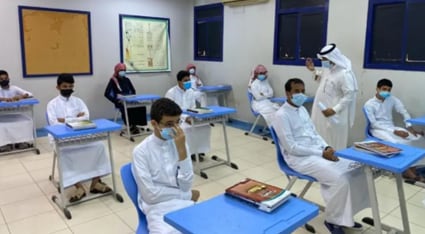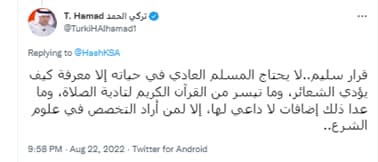Saudi Arabia's Education Ministry recently announced the introduction of a new curriculum for the kingdom's schools, which involves, among other changes, a reduction of hours devoted to religious studies. As part of the reform, Qur'an and Islamic studies have been merged into a single subject and the number of classes devoted to these two topics has been reduced from 34 to 15 weekly classes in middle school and from 38 to 30 weekly classes in primary school.
In addition, a new subject, financial education, will be introduced in high school. Further changes in the curriculum have not year been made public, but the online London-based daily Raialyoum.com reported that the hours devoted to math, science, English and Arabic will be increased.
Liberal intellectual Turki Al-Hamad, who is regarded as close to Saudi Crown Prince Muhammad bin Salman, was quick to tweet his approval of the reform, calling it "a correct decision." Several Saudi journalists praised the reform as well, calling it a brave decision that has long been necessary and which will help cultivate a new generation that will advance the country and the Saudi economy.
It should be noted that that bin Salman has placed emphasis on religious reform, calling it a necessary condition for preparing the kingdom for the challenges of the modern age. In an interview he gave in May 2021 to several Saudi television channels, marking the fifth anniversary of Saudi Arabia's Vision 2030, he said that it is always possible to apply independent reasoning (ijtihad) in interpreting the Islamic shari'a.[1]

Saudi school (Source: Alarabiya.net)
This report reviews the details announced by the Saudi Education Ministry about the educational reform, and the reactions of several intellectuals and journalists to it.
Saudi Education Ministry: The New Curriculum Includes Fewer Religion Classes
Reporting on the educational reform, the English-language daily Saudi Gazette wrote on August 23, 2022: "The [Education] Ministry stated that it has stopped working with the guide of previous study plans, which was issued in the last academic year, and started working in accordance with the new guide for the current year of 1444 AH [2022]. The Ministry has issued directives in this regard to all public education schools, kindergartens, schools for memorizing the Holy Qur’an, schools of special education and continuing education, scientific institutes, religious institutes in Makkah and Madinah, and national identity programs in international schools.
"According to the new guide, the subjects of Islamic studies and the Holy Qur’an in the elementary and intermediate schools will be combined into one subject under the name of the Holy Qur’an and Islamic Studies. The total classes of the subject have been reduced from 34 weekly classes in the intermediate level to 15 classes while the number of classes in the elementary level [was] reduced from 38 classes to 30 classes. The subject of financial knowledge that was approved in the first year of secondary [school]…
"There have been no other significant changes in the study plans except [an] increase in the weekly study hours of some subjects and decrease of study hours of some other subjects."[2]
The online daily Raialyoum.com reported the same day that, as part of the reform, more hours will be devoted to the subjects of mathematics, science, English and Arabic. It added that "this decision is in line with Saudi Crown Prince Muhammad bin Salman's Vision 2030 and his commitment to combating the extremists… It appears that [the reform] was carefully considered, and aims to cultivate generations of Saudis who will be less extremist."[3]
SUPPORT OUR WORK

Saudi Intellectual: This Is A Correct Measure; A Simple Muslim Needs To Know Only The Rituals And Prayers
Turki Al-Hamad, a liberal intellectual who is regarded as an associate of Saudi Crown Prince Muhammad bin Salman, welcomed the reform, writing on his personal Twitter page: "This is a correct decision. All a simple Muslim needs to know in his life is how to perform the religious rituals, and what Allah gave us to read in the Holy Qur'an so as to perform the prayer. Anything more than this is unnecessary, except for people who want to specialize in religious law."[4]

Turki Al-Hamad's tweet
Saudi Journalist: There Is No Harm In Reforming Religious Education; The Point Is To Actually Do This, Not Just Talk
Saudi journalist Mashari Al-Dhaidi likewise welcomed the news about the reform. He wrote in his August 24 column in the daily Al-Sharq Al-Awsat: "Nearly every week we hear about a debate in some Arab or Muslim country about some fatwa or controversial religious opinion. These incidents are accompanied by an insistent, ongoing demand for 'religious reform,' which is essentially a reform of religious education. However, the minute we begin debating the ways to implement [this reform], disagreements and ideological struggles arise, and this causes the demand for implementation to become less effective and feasible. At least [that has been the case] until now.
"The debate on reforming the religious education is not new. It was a major concern and program of many of those we call the pioneers of reform in the Muslim world, including the Tunisian Al-Tahir ibn 'Ashur, as well as the Egyptian Muhammad 'Abduh… who militated for reform in the religious education at Al-Azhar and encountered the refusal of the Al-Azhar sheikhs…
"What caused [me] to contemplate this is the news that the Saudi Education Ministry has directed the schools… to adopt a [new] curriculum it has developed and published…
"Religious studies are a practical and academic field that is not immune to development, and changing it is not a transgression. This is because the [Islamic] shari'a itself is a living thing, in which [new] aspects emerge while others atrophy and die. An example is the laws on slaves and slavery, [such as] the written contract between the slave and his master in which the slave buys his freedom, [other laws] regarding the freeing of slaves, and additional issues that dominated the religious writings for generations. Where are these laws today? The same is true for the laws pertaining to captives and spoils [of war]…
"What I wish to say here is that it is easy to talk about the need for religious reform, including the reform of religious education – but the real achievement is to actually implement this reform and defend it against those who oppose it."[5]
Saudi Writer: Educational Reform Will Create A Modern Society Capable Of Competing In The Global Arena
Saudi journalist and author Nora Shanar wrote in her column on the liberal Saudi website Elpah.com: "Education has gone through several stages before developing the teaching methods and the academic subjects that exist today. The [Saudi] kingdom is interested in education, since it is an important element of its Vision 2030… The graduates of the education [system] are the ones who will advance our economy, thanks to the cultivation of human capital specializing in various fields…
"With Allah's help, our government is making intense efforts to train teachers and develop curricula and teaching methods for the Saudi students, as well as the schools and universities, so that the graduates will be proficient administrators who can serve the national economy.
"The recent decision on reforms is aimed at cultivating a knowledgeable society [capable of] competing in the global [arena]… This is why the Saudi kingdom's Education Ministry decided to merge the subjects of Qur'an and Islamic studies… and thereby increase modern subjects, so as to adapt us to the [age of] the scientific revolution…"[6]
[1] See MEMRI Inquiry & Analysis Series No. 1575, Saudi Crown Prince Mohammed Bin Salman's Far-Reaching Statements On Religion Herald Further Reforms In The Kingdom, May 4, 2021.
[2] Saudi Gazette (Saudi Arabia), August 23, 2022.
[3] Raialyoum.com, August 23, 2022.
[4] Twitter.com/TurkiHAlhamad1, August 22, 2022.
[5] Al-Sharq Al-Awsat (London), August 24, 2022.
[6] Elpah.com, August 23, 2022.




